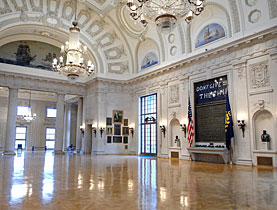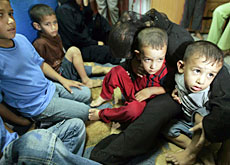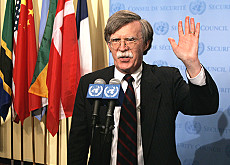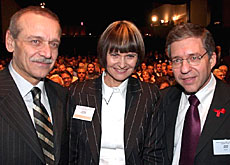Breakthrough announced at Middle East talks

Israeli and Palestinian leaders have agreed to immediately resume long-stalled peace talks.
Israeli Prime Minister Ehud Olmert and Palestinian President Mahmoud Abbas made the pledge on Tuesday at the Middle East summit in Annapolis.
A joint statement read by Olmert, Abbas and President Bush said the talks to start next month would be the first serious and substantive negotiations in seven years.
“We express our determination to bring an end to bloodshed, suffering and decades of conflict between our peoples; to usher in a new era of peace, based on freedom, security, justice, dignity, respect and mutual recognition; to propagate a culture of peace and nonviolence; to confront terrorism and incitement, whether committed by Palestinians or Israelis,” the statement said.
The aim was to conclude an agreement by the end of 2008.
However analysts say Israeli Prime Minister Ehud Olmert and Palestinian President Mahmoud Abbas both hold fragile positions internally and there is scepticism over whether they can push through any political concessions agreed in Annapolis.
Over 40 organisations and countries have converged on the United States city for the summit.
Switzerland is notable by its absence, something that could be explained by Swiss foreign policy in the Middle East, say observers.
The conference is being attended by members of the diplomatic “quartet” on the Middle East – the US, the European Union, the United Nations and Russia – members of the UN Security Council, the Group of Eight industrialised nations, the Arab League and the Organisation of the Islamic Conference, among others.
Iran is not present – and neither is Switzerland, as Washington did not invite it.
Swiss backing
However Swiss foreign ministry spokesman Lars Knuchel said Switzerland was backing the conference.
When drawing up the invitation list for the summit, Washington’s preference was for states from the region and those belonging to the quartet, but others such as Denmark, Greece, Sweden and Slovenia will also be present at the talks at the US Naval Academy in Annapolis.
In the past, the Swiss foreign ministry has always been a strong supporter of Middle East peace initiatives. At the end of 2003 it played a key role in drawing up the “Geneva Initiative” – an extra-governmental, unofficial draft peace plan established between Israel and Palestine.
“The process which is now beginning is a new start on the official scene,” stressed Knuchel.
Over the past few weeks, the Palestinian and Israeli delegations have been preparing for the Annapolis summit by talking to “figures involved in the Geneva Initiative negotiations”, he noted.
For both sides this was important as “the experiences and knowledge gained from the Geneva Initiative can be useful for the current process”.
Limited role
Hasni Abidi, head of the Study and Research Centre for the Arab and Mediterranean World (CERMAM) in Geneva, told swissinfo that one reason why Switzerland was not invited could be that “Swiss diplomatic presence in the region is not strong enough”.
He stressed that the Annapolis conference aims at sharing out the roles and “Switzerland’s role in the region is limited”.
Another reason, according to Abidi, is that the US gathering is an official conference, whereas Switzerland is mainly involved in informal talks, such as the inter-Lebanese dialogue.
“For several years, Switzerland has been pursuing its own path – a discrete diplomacy with special emphasis on humanitarian aid,” he added.
Too autonomous
Former Swiss diplomat and Middle East expert, Yves Besson, felt there were numerous reasons why the Swiss were not in Annapolis.
One is that the Swiss sometimes pursue a fairly autonomous diplomatic strategy – such as in Iran, Syria or concerning the Israeli-Palestinian conflict – which is apparently viewed with scepticism by the US and Israel.
For Iran, for example, the Swiss proposals on the nuclear issue may have upset some people.
Another possible explanation, said Besson, is linked to Swiss efforts to initiate talks between Syria and Israel.
On top of that, the main actors in the Middle East only gave the Geneva Initiative a lukewarm reception and Swiss policy towards Hamas could also have played a role, he added.
Basically, Switzerland has an interesting and rational diplomatic approach, said Besson. But it is probably too small to impose its own views.
“It’s the bad luck of those who are in the right too early,” he concluded.
swissinfo, Islah Bakhat and Rita Emch
President George W. Bush opened the most ambitious round of international Middle East diplomacy in seven years on Tuesday, trying to achieve in his final 14 months in office a goal that has eluded US leaders for decades.
Over recent months Secretary of State Condoleeza Rice has made a series of visits to the Middle East to try to breathe life into the stalled peace process.
On the eve of the summit, Bush called on both sides to make “difficult compromises” to secure a peace deal. Israeli Prime Minister Ehud Olmert and Palestinian President Mahmoud Abbas both expressed optimism about the talks.
The issues are the same as they were seven years ago, the last time substantive negotiations were held: sharing Jerusalem, the shape of a future Palestinian state, and what happens to Palestinian refugees exiled from homes that are now in Israel.
The situation on the ground is said to be even more complicated and compromise less likely than in 2000. Israeli opposition to sharing Jerusalem has perhaps become more entrenched as its settlements around the city have grown. Continued Palestinian rocket fire from Gaza has also hardened Israeli opposition to withdrawals in the West Bank.
The splits among Palestinians between Fatah and Hamas mean that no one has an uncontested claim to lead the Palestinians. Hamas, which won Palestinian Authority parliamentary elections in January 2006, is not represented at Annapolis.
The Geneva Initiative proposed to give Palestinians almost all the West Bank and Gaza Strip and part of Jerusalem, drawing Israel’s borders close to what existed before the 1967 war.
In return for removing most of the Israeli settlements in those areas, the Palestinians would limit their “right of return” to Israel to a number specified by Israel and will drop all other claims and demands from Israel.

In compliance with the JTI standards
More: SWI swissinfo.ch certified by the Journalism Trust Initiative



You can find an overview of ongoing debates with our journalists here. Please join us!
If you want to start a conversation about a topic raised in this article or want to report factual errors, email us at english@swissinfo.ch.